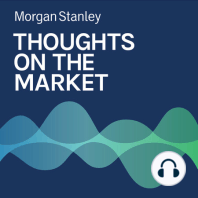3 min listen
Are Credit Scores Inflated?
ratings:
Length:
5 minutes
Released:
Mar 27, 2024
Format:
Podcast episode
Description
Consumer credit scores have ticked higher in the last two years – but so have the rate of delinquencies and defaults. Our Global Head of Fixed Income discusses “credit score migration” with the firm's Asset-Backed Security Strategist.----- Transcript -----Michael Zezas: Welcome to Thoughts on the Market. I'm Michael Zezas, Global Head of Fixed Income and Thematic Research for Morgan Stanley.Heather Berger: And I'm Heather Berger, Asset-Backed Security Strategist.Michael Zezas: And today, we'll be talking about the trend of migrating US consumer credit scores and the potential effect on equities and fixed income. It's Wednesday, March 27th at 10am in New York.Heather, I really wanted to talk to you today because we've all seen some recent news reports about delinquencies and defaults in consumer credit ticking higher over the last two years. That means more people missing payments on their car loans and credit cards, suggesting the consumer is increasingly in a stressed position. But at the same time, that seems to be at odds with what's been an upward trend in consumers’ credit scores, which on its face should suggest the consumer is in a healthier position.So, it all begs the question: what's really going on here with the consumer, and what does it mean for markets? Now, you and your colleagues have been doing some really fascinating work showing that in order to get to the truth here, we have to understand that there's a measurement problem. There’s quirks in the data that, when you understand them, mean you have a more accurate picture of the health of the consumer. And that, in turn, can clarify some opportunities in the fixed income and equity markets.So, this measurement problem seems to center around the idea of credit score migration. Can you start by explaining what exactly is credit score migration?Heather Berger: Sure. So, credit scores are used as a way to estimate expected default risk on consumer loans. And these scores are really the most standardized and widespread way of evaluating consumer credit quality. Scores are meant to be relative metrics at any point in time. So, a 700 score today is meant to indicate less default risk than a 600 score today, but a 700 score today isn't necessarily the same as a 700 score a few years ago.Credit scores have been increasing throughout the past decade; most extremely from 2020 to 2021, largely due to COVID related factors such as stimulus checks. The average credit score is up 10 points in the past four years, and this trend has broadly been referred to as credit score migration.Michael Zezas: So, just so we can have a concrete example, can you talk about how this has affected one particular consumer credit category?Heather Berger: Well, as you mentioned earlier, delinquencies and defaults have been rising across consumer loan types, whether it's autos, credit cards, or personal loans. The macro backdrop has definitely contributed to this, as inflation has weighed on consumers real disposable income, but we do think that score migration has had an impact as well, considering the large changes over the past few years.Looking at auto loans, for example, with the same credit scores from 2022 versus loans from 2018, we see that delinquency rates on the 2022 loans are up to 60 per cent higher than on the 2018 loans. We estimate that 30 to 50 per cent of this increase can be due to effects of credit score migration.Michael Zezas: And is there anything we can assume here about the actual health of the US consumer? Do we see delinquencies improving or getting worse?Heather Berger: I think one of the main takeaways here is that since score migration impacts performance metrics, we shouldn't necessarily extrapolate delinquency data to broader consumer health. Despite the high delinquency rates, our economists do expect consumers to remain afloat.They're forecasting a modest slowdown in consumer spending this year as we move off a hot labor market and continue to face elevated inter
Released:
Mar 27, 2024
Format:
Podcast episode
Titles in the series (100)
Mike Wilson: 3 Summer Surprises Investors Could Be Missing by Thoughts on the Market
